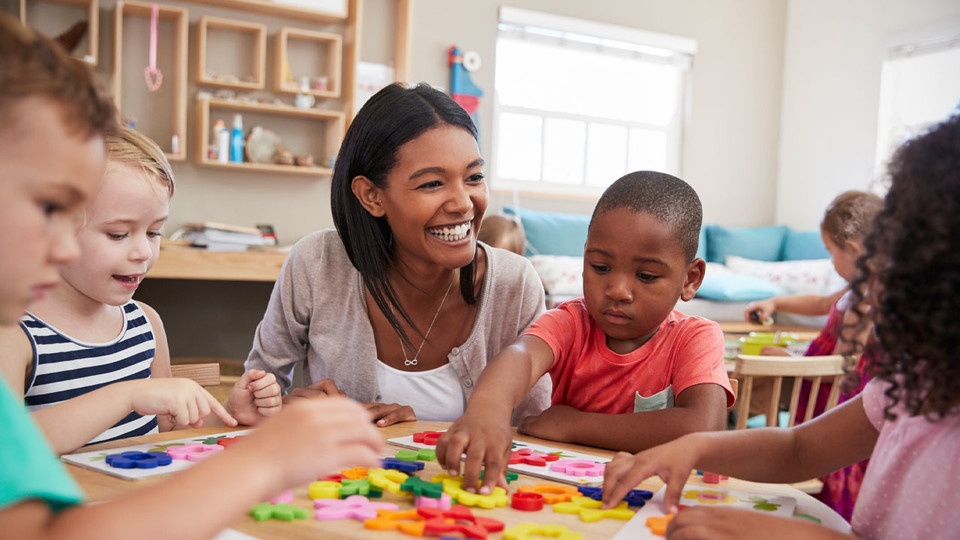Chuck Green, May 18, 2020
Interdisciplinary study leverages technology to assess preschool teachers’ resilience
In a typical preschool classroom with as many as two-dozen children, there are bound to be times of elevated stress for the teacher — and sometimes the students.
Along with meeting the needs of several children, teachers juggle many emotional and physical demands in their daily work, often with limited resources. Following an early childhood curriculum or philosophy, engaging families, maintaining a safe environment and dealing with interpersonal conflicts are just some of their daily classroom tasks.
An ongoing Nebraska study is exploring ways to help preschool teachers identify and tame their stressors to ensure high-quality learning for their students.
The two-year project is funded by a grant from the National Health Institutes and housed at the Nebraska Center for Research on Children, Youth, Families and Schools. It will evaluate the impact of various stressors on early childhood teachers’ well-being and caregiving behavior, and on children’s cognitive and behavioral self-regulation
“We place this huge onus on teachers to create self-regulated spaces and support children’s regulation, but we don’t take into account the stress in teachers’ lives,” said Carrie Clark, assistant professor of educational psychology and a project co-principal investigator. “But often, teachers are not highly paid, and their job can seem thankless and even unstable at times.”
In the United States, 64% of children ages 3 to 5 spend an average of 36 hours a week in non-relative care. Research shows that sensitive, responsive caregiving experiences are essential to help children meet their developmental potential, which leads to academic readiness, socio-emotional competence and improved health.
Although early childhood teachers frequently experience elevated occupational and psychosocial stress, surprisingly little is known about the mechanisms that link those stressors to teachers’ caregiving behavior — or to children’s self-regulation.
Clark and Co-PI Holly Hatton-Bowers, assistant professor of child, youth and family studies, are working with other Nebraska researchers to test a model that conceptualizes emotion regulation, mindfulness, compassion and physiological regulation as key factors in managing stress and fostering well-being. Examining these factors may generate innovative strategies that promote preschool teachers’ emotional well-being and ultimately adaptive, healthy self-regulation for young children.
Understanding the processes that enable teachers to remain healthy and resilient — and that contribute to positive development of children in their care through sensitive, responsive interactions — could have dramatic implications for policy and prevention efforts, Clark said.
“This time in preschool really is critical for children’s development; this is when self-regulation skills are coming online,” she said. “But there is generally a lack of focus on teachers’ indicators for well-being. We want to identify supports we can put in place to help teachers avoid burning out, and how we even define ‘burning out.’”
Along with Clark and Hatton-Bowers, co-investigators include Jessica Calvi, research assistant professor at the Center for Brain, Biology and Behavior; Gilbert Parra, associate professor of child, youth and family studies; Lorey Wheeler, CYFS research associate professor; and Kimberly Tyler, Willa Cather Professor and graduate chair in sociology.
For the project, researchers will recruit 80 Nebraska preschool teachers with varied experience levels and about 240 preschool children and their parents. Teachers will complete self-assessments and provide biofeedback through cortisol samples and monitored heart rate variability (HRV) — a measure of the brain’s capacity to modulate emotional and interpersonal responses via the parasympathetic nervous system — to assess their occupational, psychosocial and physical stressors and supports, as well as their emotion regulation, mindfulness and compassion.
The HRV and cortisol measures may provide new insights into teachers’ emotion regulation in the preschool classroom and its impact on their students.
“By having these physiological markers, we hope to develop some self-calming methods,” Hatton-Bowers said. “For example, mindfulness and compassion may be promising ways to promote teacher emotional well-being, and with this study we can better understand some of the processes involved.”
For three consecutive workdays in their classrooms, teachers will wear an Actiheart — a compact, chest-worn monitoring device that records HRV.
“These measurements of heart rate variability really get to the moment-to-moment fluctuations of teacher stress, and how teachers are coping with emotion,” Clark said.
Additionally, teachers will maintain a daily “emotion diary” to record how their emotions pair with daily stress. Their classroom interactions with children will also be observed.
Participating preschoolers will complete 15-minute iPad assessments developed for their age group to measure their executive function skills, such as the ability to shift their attention from one task to another, and their behavior will be observed to determine how settled and well-regulated they are in the classroom.
This study builds upon the team’s evaluation of the Cultivating Healthy Intentional Mindful Educators program, which Hatton-Bowers co-founded in 2017. The evaluation demonstrated that practicing mindfulness and reflection slowed depletion of teachers’ cortisol and decreased emotion dysregulation as they progressed through the workday. This project will identify whether that benefits children’s self-regulation.
Because of the COVID-19 pandemic, the project’s start has been delayed until teachers and their classes can reassemble, in-person.
“In some ways, the pandemic will make this project even more relevant,” Clark said, noting the additional stress caused by the absence of in-person classes.
The ultimate goal, Hatton-Bowers said, is to identify potentially healthy, adaptive ways for teachers to regulate their emotions and promote high-quality early care experiences.
“We want teachers to be more present, responsive and sensitive, and able to scaffold children’s learning, which we hope supports children’s self-regulation,” she said.






